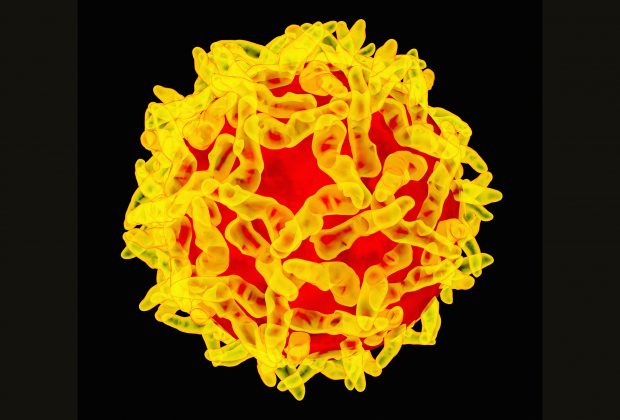Yellow fever is a viral disease that is transmitted to humans through the bite of infected mosquitoes. Yellow fever occurs in tropical regions of Africa and in parts of South America. Yellow fever is a very rare cause of illness in U.S. travelers. The last epidemic of yellow fever in North America occurred in New Orleans in 1905.
Yellow fever is caused by infection with yellow fever virus, which is transmitted by the bite of infected mosquitoes.
Yellow fever can be prevented by vaccination. Travelers should also take precautions against mosquito bites when in areas with yellow fever transmission.
Travelers should get vaccinated for yellow fever before visiting areas where yellow fever occurs. In the United States, the vaccine is given only at designated yellow fever vaccination centers. International regulations require proof of yellow fever vaccination for travel to and from certain countries. People who get vaccinated should be given an International Certificate of Vaccination.
Avoid mosquito bites when traveling in tropical areas. Mosquitoes that spread yellow fever usually bite during the day, especially at dusk and dawn.
When outside:
- Wear long-sleeved clothing and long pants. For extra protection, treat clothing with the insecticide permethrin.
- Use insect repellent on exposed skin. Repellents containing DEET (N,N-diethylmetatoluamide), Picaridin (KBR 3023), IR 3535, p-Menthane 3,8-diole (PMD or oil of lemon eucalyptus) are effective. Follow application instructions carefully.
When inside:
- Stay in well-screened areas as much as possible.
- Spray living and sleeping areas with insecticide.
There are two kinds of yellow fever, spread by two different cycles of infection.
Jungle yellow fever is mainly a disease of monkeys. It is spread from infected mosquitoes to monkeys in the tropical rain forest. People get jungle yellow fever when they are bitten by mosquitoes that have been infected after feeding on infected monkeys. Jungle yellow fever is rare and occurs mainly in persons who live or work in tropical rain forests.
Urban yellow fever is a disease of humans. It is spread by mosquitoes that have been infected by other people. Aedes aegypti is the type of mosquito that usually carries yellow fever from human to human. These mosquitoes have adapted to living among humans in cities, towns, and villages. Their larvae grow in discarded tires, flower pots, oil drums, and water storage containers close to human dwellings. Urban yellow fever is the cause of most yellow fever outbreaks and epidemics.
Illness ranges in severity from a self-limited febrile illness to severe hepatitis and hemorrhagic fever. Many yellow fever infections are mild, but the disease can cause severe, life-threatening illness. Symptoms of severe infection are high fever, chills, headache, muscle aches, vomiting, and backache. After a brief recovery period, the infection can lead to shock, bleeding, and kidney and liver failure. Liver failure causes jaundice (yellowing of the skin and the whites of the eyes), which gives yellow fever its name. Severe yellow fever infections can be fatal.
The incubation period (time from infection to illness) is usually 3-6 days.
Case-fatality rates from severe disease range from 15% to more than 50%.
Side Effects
A vaccine, like any medicine, is capable of causing serious problems, such as severe allergic reactions. The risk of a vaccine causing serious harm, or death, is extremely small.
Reactions are less likely to occur after a booster dose of yellow fever vaccine than after the first dose.
Mild problems:
soreness, redness, or swelling where the shot was given
fever
aches
If these problems occur, they usually begin soon after the shot and last for 5 to 10 days. In studies, they occurred in as many as 25 percent of vaccine recipients.
Severe problems (estimates based on passive reporting):
Life-threatening allergic reaction (approximately 1 reported per 131,000 doses).
Severe nervous system reactions (approximately 1 reported per 150,000 to 250,000 doses).
Life-threatening severe illness with major organ system failure (approximately 1 reported per 200,000 to 300,000 doses, or 1 reported per 40,000 to 50,000 doses in people 60 years of age and older). More than half of the people who suffer these side effects die.
Who Should Not Be Vaccinated
Some people should not get Yellow Fever vaccine.
Persons who have ever had a life-threatening allergic reaction to eggs, chicken, gelatin or to a previous yellow fever vaccine.
Infants younger than 9 months of age. For infants 6 to 8 months of age who cannot avoid travel to a yellow fever area, discuss vaccination with their doctor. Under no circumstances should infants younger than 6 months of age be vaccinated.
Pregnant women and nursing mothers should avoid or postpone travel to a yellow fever area. If travel cannot be avoided, discuss vaccination with your doctor.
Check with your doctor before getting yellow fever vaccine if you:
- Have a history of allergy to eggs, chicken, or gelatin
- Have HIV/AIDS or another disease that affects the immune system
- Have been under treatment for 2 weeks or longer with drugs that affect the immune system, such as steroids
- Have any kind of cancer
- Are taking cancer treatment with X-rays or drugs
- Your thymus gland has been removed, or if you have a history of problems with your thymus, such as myasthenia gravis, DiGeorge syndrome, or thymoma.
If you are 65 or older, discuss with your physician the risks and benefits of vaccination in the context of your risk for exposure to yellow fever virus based on your destination.
If you cannot get the vaccine because of a medical reason and proof of yellow fever vaccination is required for your travel, your doctor can give you a waiver letter. When planning to use a waiver letter, you should also obtain specific advice from the embassy of the country or countries you plan to visit.
If you cannot get the vaccine, discuss with your doctor other ways to prevent yellow fever.

